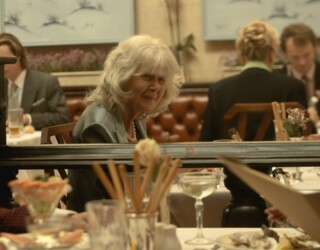Par for the Coarsening
Ian Patterson
It’s always a shock when imagined characters from novels are given a kind of reality by TV actors. Everybody has their own idea of Mr Darcy or Leopold Bloom, Mrs Dalloway or Emma Bovary, and most incarnations will upset somebody. It does seem perverse, though, to change as much about the characters’ appearance as Disney’s adaptation of Jilly Cooper’s best novel, Rivals, has done. If we know anything about its hero Rupert Campbell-Black, it’s that he is aristocratic, staggeringly good-looking, with fair hair and blue eyes, so to see him posing about like a sulky fashion model, dark-haired and sultry, is – well, wrong.
Taggie, the admirable antidote to all the rivalry, and Rupert’s redemption, is also staggeringly good-looking, but gawkily tall at five foot ten. So why is her TV version not remotely tall? Declan, her father, is ‘tall, broad in the shoulder and heroic-looking’, and wears half-moon specs, so it was surprising to see him shorter, with a heavy moustache and no glasses. And so on. But I suppose that’s par for the coarsening that comes with TV adaptations.
Rivals was set in 1986 and published in 1988, when I was the same age as Rupert, which qualifies the adaptation to be historical drama, and therefore to need explicit historical explanation to be added to the mix. A gay subplot has been added and, in a very brief scene, Declan is forbidden to publicise a leak he’s been given about Section 28 of the Local Government Act (the infamous clause that banned local authorities from ‘promoting homosexuality’). Care has been taken to make sure that clothes, cars, food and music are right for the period; there’s plenty of smoking; the dialogue is fine on the whole, keeping many of Cooper’s best lines, and the acting is gratifyingly good, with particularly fine performances from Danny Dyer as Freddie Jones, the electronics multimillionaire with his awful wig, Katherine Parkinson as Lizzie Vereker, and David Tennant as the villain of the piece, Lord Tony Baddingham. And yet … too much has been lost.
Turning a seven-hundred-page novel into eight one-hour episodes is bound to require abridgement: the art is not to make it abridged too far. Or to take it too far from the tone of the original text, which is even harder. The essence of the plot is rivalry – commercial, sexual, financial, power and class – but that’s just the plot; the essence of the novel is redemption and romantic fulfilment, as is proper in a comedy.
Rupert, the aristocratic shagger and Thatcherite minister, needs to come to terms with his interior emptiness and fill it with solid joys and lasting pleasures, not the short-term triumphs of seduction, sex and alcohol that he’s using as substitutes. The one scene in which this is made explicit, in an empty Wembley stadium, can’t help but trivialise what is already a sentimental episode by bringing his internal thoughts to life so the viewers can hear them. It’s a moment that requires the authorial narrative which is the real steadying influence on the book, dropping puns and jokes all over the place regardless of the speaker, so the reader is always aware, even in the bleakest moments, that things will turn out well in the end.
So – spoiler alert – why did they have to ruin the ending? Why descend to physical violence and the clichéd death (or is it?) of Tony and the cliff-hanging abandonment of Cameron Cook (played by Nafessa Williams) left holding the blood-stained statuette? Why is Rupert’s final realisation of love celebrated by soft-focus snogging in the bluebells rather than the tear-inducing scene of dyslexic Taggie waiting for him at the airport with her misspelt ‘Roopurt’ name board? And why is her wayward mother Maud’s role in the dénouement altered?
The true comedy of the book is emphasised by the semi-subliminal play with A Midsummer Night’s Dream, with Jilly Cooper as an authorial Puck rupturing and reuniting pairs of lovers. Has so much changed in the 38 years since Rupert and I were 38 that no equivalent of that elegant mending could be found? In the final pages Maud returns chastened to her husband, saying, ‘My Oberon! What visions have I seen! Me thought I was enamoured of an ass,’ before they disappear into their bedroom. ‘Pa and Ma for the course,’ as Rupert says.

Comments